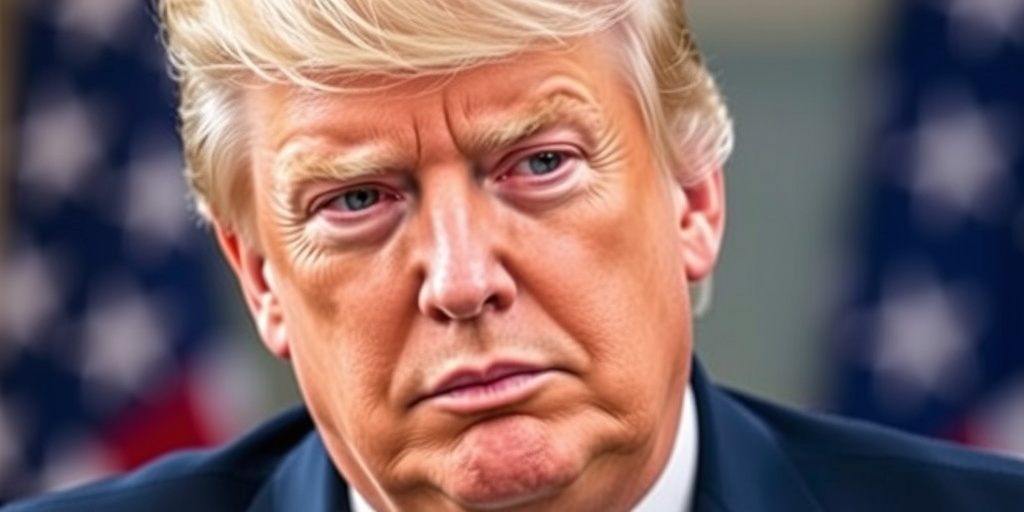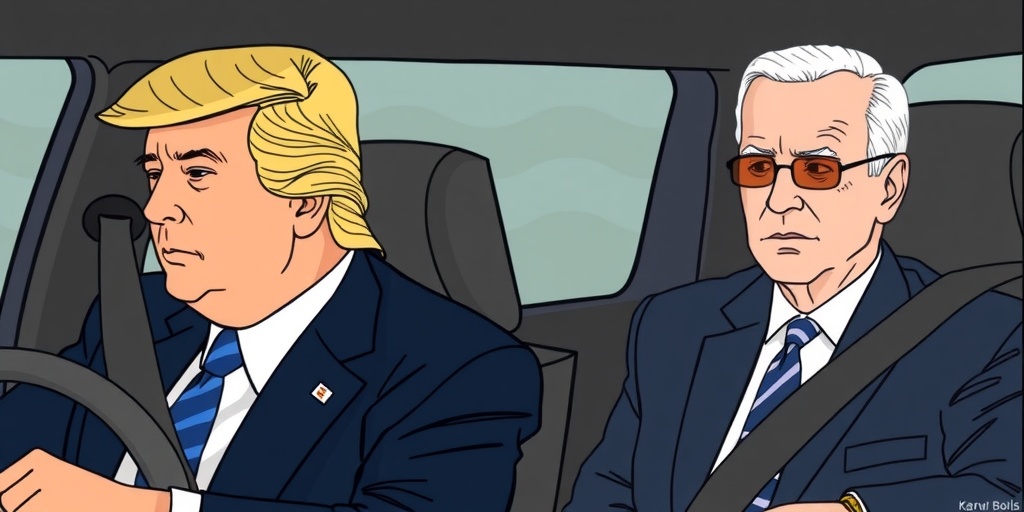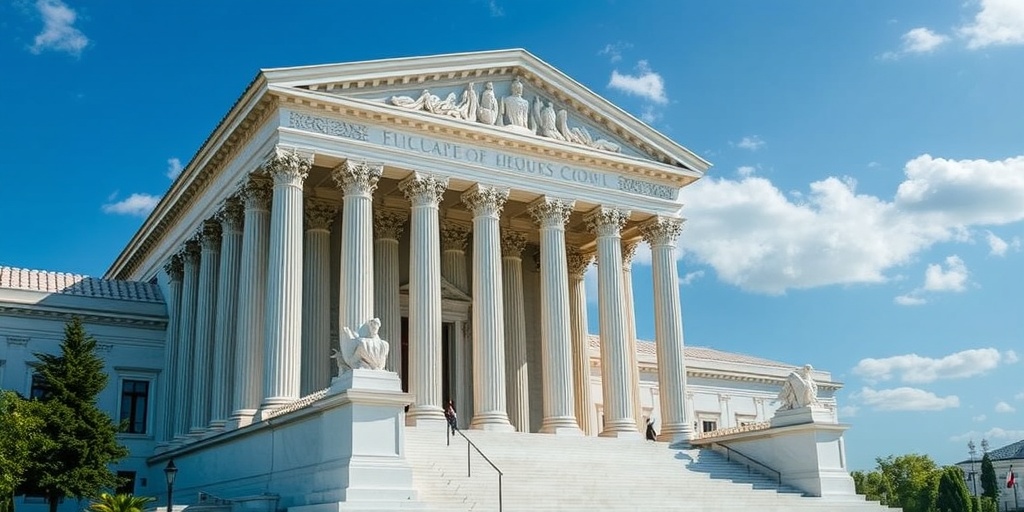Now Reading: Trump’s Third Term Ambitions Challenge Constitution and Democracy
-
01
Trump’s Third Term Ambitions Challenge Constitution and Democracy
Trump’s Third Term Ambitions Challenge Constitution and Democracy

Title: Trump’s Third Term Controversy: A Closer Look at the Constitutional Implications
In recent public statements, former President Donald Trump has once again stirred political controversy by suggesting he may seek to remain in power even after the Constitution mandates the transfer of presidential authority. His remarks follow a previous incident where he jokingly expressed a desire to be a "dictator for a day." Initially characterized as humorous, Trump’s latest assertions have not been met with the same levity, prompting serious discussions about the potential implications for the nation’s democratic fabric.
Critics of Trump argue that his commentary reflects a troubling trend of undermining democratic norms, which poses real threats to the constitutional system established nearly 250 years ago. Representative Daniel Goldman, a Democrat from New York and lead counsel during Trump’s first impeachment, expressed concerns that Trump’s actions are indicative of an ongoing effort to destabilize democracy. He emphasized that the ramifications of Trump’s rhetoric should not be dismissed as mere jokes, suggesting that such conversations highlight a serious assault on democratic values.
Despite Trump’s detractors, his allies view these remarks as exaggerated claims from a political opposition struggling to accept past electoral defeats. They maintain that Trump, now 78, has no legitimate intent to pursue a third term, arguing that any attempt to bypass constitutional limits would ultimately rest on the electorate’s decision. Nevertheless, the discourse surrounding a potential third term cannot be easily brushed aside, as Trump has a history of making seemingly outrageous statements that later gain traction through repetition and normalization.
Throughout his political career, Trump has demonstrated a propensity to challenge established norms and push the boundaries of executive power. In his first term, he attempted to overturn the results of the 2020 election after losing to Joe Biden, advocating for what he termed the “termination” of the Constitution to secure another term. In his current term, he has reportedly escalated efforts to consolidate power, prompting fears among legal experts and political analysts regarding the erosion of checks and balances.
The possibility of Trump seeking a third term raises significant questions about the implications of the two-term limit established by the 22nd Amendment, enacted in response to Franklin D. Roosevelt’s unprecedented third and fourth terms during World War II. The amendment reflects a historical consensus on the need to limit presidential power through term limits. While some politicians, such as Ronald Reagan and Bill Clinton, have hinted at their desire to repeal the amendment, none have actively sought to do so for their own benefit.
Challenging the two-term limit is fraught with legal complexities, as any attempt to amend the Constitution requires substantial consensus within Congress and among the states. Suggestions have emerged from within Trump’s circle, including a constitutional amendment proposed by Representative Andy Ogles that would allow former presidents who did not serve consecutive terms to run again. However, this remains a far-fetched scenario given the arduous process involved in amending the Constitution.
While Trump reportedly dismissed serious contemplation of a third term, he has publicly claimed that "there are methods" to circumvent constitutional limitations. Speculations have surfaced regarding unconventional strategies, such as running for vice president with a compliant presidential candidate who could resign, thereby paving the way for Trump’s return. However, legal scholars debate the validity of such strategies, examining whether Trump’s eligibility would hold under existing constitutional provisions.
Amidst the discussions, experts caution against viewing Trump’s statements merely as idle speculation or a passing trend. Legal scholars like J. Michael Luttig assert that Trump’s rhetoric embodies a troubling disregard for constitutional integrity, mocking the very principles foundational to American democracy. Public opinion also reflects a complex landscape; while a majority of Americans oppose Trump’s bid for a third term, many predict he will nonetheless attempt to do so.
The recent tumultuous political climate has rekindled fears reminiscent of authoritarian regime behaviors seen in other nations where leaders manipulate constitutional mandates to extend their stay in power. Historical comparisons have been drawn to figures like Vladimir Putin and Alexander Lukashenko, who have managed to circumvent term limits through various strategic maneuvers.
As this discourse unfolds, the resilience of American democracy is put to the test. Advocates for safeguarding democratic values urge vigilance in response to Trump’s rhetoric, asserting that the threats to constitutional norms should be addressed seriously rather than dismissed as mere political theater.
In summary, while Trump’s discussions around a potential third term orbit around humor and hyperbole for some, they unearth deeper anxieties about the state of democracy in America. As citizens and lawmakers navigate this intricate political landscape, the importance of upholding constitutional boundaries and fostering a respect for democratic processes remains paramount. The ongoing developments surrounding Trump’s presidency serve as a crucial reminder of the fragility of democratic institutions and the need for active engagement to protect them.
Stay Informed With the Latest & Most Important News
Previous Post
Next Post
-
 01New technology breakthrough has everyone talking right now
01New technology breakthrough has everyone talking right now -
 02Unbelievable life hack everyone needs to try today
02Unbelievable life hack everyone needs to try today -
 03Fascinating discovery found buried deep beneath the ocean
03Fascinating discovery found buried deep beneath the ocean -
 04Man invents genius device that solves everyday problems
04Man invents genius device that solves everyday problems -
 05Shocking discovery that changes what we know forever
05Shocking discovery that changes what we know forever -
 06Internet goes wild over celebrity’s unexpected fashion choice
06Internet goes wild over celebrity’s unexpected fashion choice -
 07Rare animal sighting stuns scientists and wildlife lovers
07Rare animal sighting stuns scientists and wildlife lovers





















